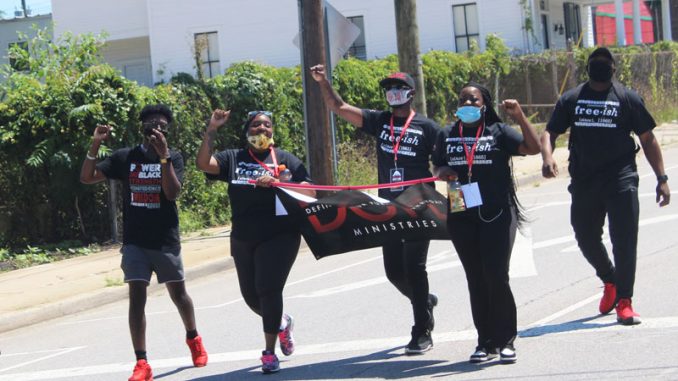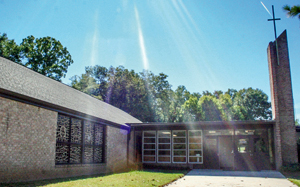
GREENVILLE—Prominent African American leaders in the Church are praising young Catholics who are taking active roles to address racial inequality, an issue the Diocese of Charleston recently engaged in via the Internet.
Franciscan Father Patrick Tuttle, pastor at St. Anthony of Padua Church, led a 90-minute Zoom meeting July 6 that was joined by about 50 participants, the majority of them diocesan youth and young adult coordinators and young adults from parishes around the diocese.
Cara Lawley, associate director of the diocese’s young adult ministry, said the discussion offers guidance on how people can stand against racism, as well as advocate for peace and justice.
For the past 15 years, Father Tuttle has led a parish and school located in a predominantly Black neighborhood. In that time, he has shepherded the growth of the parish, both in the number of registered parishioners and in significant improvements at the parish school, which serves mostly African American children.
Speaking from his office next to the school, Father Tuttle challenged the young adults to recognize and embrace God’s gift of diversity, and to value everything and everyone God has made. To do that, he said, means to simply listen to each other.
“Diversity, in itself, is education,” Father Tuttle said. “Every student who comes (to St. Anthony School) is treated as if they are a gift from God,” he said, and has given the school “the wonderful opportunity to unpack” that gift.
Father Tuttle said his parish “celebrates the genius of Black Catholic spirituality,” that includes whole-body worship, emotive preaching, family gatherings, storytelling and picnics, none of which are strictly reserved for African Americans.
“Black folks do those things, and it should be celebrated,” he said. “And, because they do them and because it’s celebrated, hundreds and hundreds of white folks have come because it’s so life-giving.”
Recently, Sister Anita Baird, a member of the Society of the Daughters of the Heart of Mary, and the founding director of the Archdiocese of Chicago’s Office for Racial Justice, said it’s time to listen to young people.
“We need to listen to voices of color, but those of us who are older need to listen to those that are younger,” Sister Baird said. “People in my generation have not gotten it right; we have to get out of the way.”
Mary Beth Vernau, a youth minister at Transfiguration Church in Blythewood, said she has seen acts of racism on “different levels and in different cultures.”
Vernau said she wants to learn how to effectively minister and advocate for those families and their students, knowing “I will never fully understand, as a white woman, exactly what it means to be discriminated against.
“I want to minister and speak to those students in their hearts in the best way I can,” she said. Doing so, in part, means leaving the familiar behind.
“To enter into an appreciation of the diversity means you have to get with people different than you,” Father Tuttle said. “You have to make yourself spend time with them. You will never move forward if spend your time with people mostly like you.”
He said diverse voices in the Church can be celebrated by telling their stories and sharing that knowledge, that education, with others. That’s how you get young children “aligned with success,” he said.
“You let them shine, and you get all kinds of people to shine in front of them and they will rise to the occasion,” Father Tuttle said.
Father Tuttle said change this important won’t come from government leaders.
“No meaningful movements I know of have come from the top, down. They have come from the bottom, up,” he said.
Last month faith communities gathered in Columbia for a “Faith for Black Lives March.” Organized by the Seventh District Episcopal Church in South Carolina, the event drew faith leaders from AME’s, United Methodists, Evangelical Lutherans, Baptists, Presbyterians and Catholics.
Father Tuttle said we’re seeing the continued reaction to the death of George Floyd, “a man with a knee on his neck, suffocating and calling out for his Mama while other people stand and watch,” a tragedy that spurred massive demonstrations here and abroad.
“It was too much pain for a human to watch,” he said. “The pain is being felt across the board.”
Lawley said the discussion with Father Tuttle only “scratched the surface” of an issue that holds many layers.
“The more you learn, the more you know and the more you have to heal. But, the Lord does not leave us alone in this,” she said.



